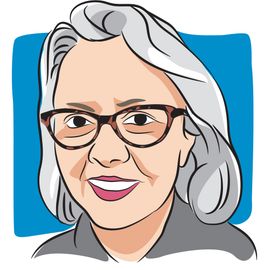- About Us
- Advertise / Support
- Editorial Board
- Contact Us
- CancerNetwork.com
- TargetedOnc.com
- OncLive.com
- OncNursingNews.com
- Terms & Conditions
- Privacy
- Do Not Sell My Information
- Washington My Health My Data
© 2025 MJH Life Sciences™ and CURE - Oncology & Cancer News for Patients & Caregivers. All rights reserved.
Cancer Survivorship Superstitions: Can a Delayed Mammogram Be Catastrophic?

Felicia Mitchell, retired from college teaching, is a poet and writer who makes her home in southwestern Virginia. She is a survivor of stage 2b HER2-positive breast cancer diagnosed in 2010. Website: www.feliciamitchell.net
A routine can feel so comfortable that change is hard. So, when my annual mammogram and cancer checkup was delayed, I tried hard not to sweat the small stuff.
I thought cancer taught me not to sweat the small stuff. I guess even I have my limits and thus room for improvement.
There I was, checking in for the annual mammogram of my remaining breast, which gets extra attention because of my cancer history. This mammogram comes annually the same day I visit the lab in the cancer center for a blood draw to prepare for a visit with my oncologist.
In between appointments, I stop at a gift shop in the hospital that connects the cancer center and the women’s center because it is so cheerful.
Perhaps, despite my visit to the gift shop, I was in a bad mood already upon entrance to the women’s center because when I looked a question asking for family history of breast cancer, I wrote “too many to count.”
Each year, the same facility that first alerted me to my breast cancer also asks me about family history and if I have ever had breast cancer and cancer treatment. I answer those questions.
This year, I rebelled at the question regarding family history, which is not like me.
Fortunately, that sheet of paper got tossed when I learned the mammogram had to be cancelled as it had been only four weeks since my third COVID-19 booster. This news is what sent me over the edge. I was told I would need to wait two more weeks because sometimes a mammogram will pick up swollen lymph nodes related to the vaccine. Or a month, as they were booked up, the clerk advised.
Losing it can be subtle. You do not have to pick up a clipboard and throw it across the room or say a harsh word to an innocent clerk whose job is simply to welcome you to your mammogram. In this case, I quibbled with the clerk, who had no control over the policy, as I explained the importance of regular mammograms for breast cancer survivors.
This delay, I exclaimed, would have a ripple effect on my oncology checkup. Fighting back tears, I thought, “And maybe my life!”
So accustomed to my October ritual, I entertained the irrational thought that any delay would guarantee more breast cancer. Thankfully, the clerk knew how to deal patiently with high emotions. I caught my breath and left.
Before leaving the building, I called the scheduling office, where another clerk scheduled me not so far out in the future but precisely one day after the wait was over. This clerk sounded like a mental health counselor, kind and understanding about my emotions regarding the change in my routine. She found a cancellation, which I later wondered was really a way to squeeze me in because the day I went back I waited, without complaining, an hour for the mammogram. The cancer center, too, set up a new appointment a week after the new mammogram.
At the rescheduled visit to the women’s center, I began by apologizing to the clerk who had helped me two weeks before. She smiled and reassured me that no offense had been taken.
Then, taking a deep breath, I used a favorite fountain pen to fill out the annoying form, a trick I thought would distract me from the repetitive questions. Neatly identifying closest relatives who had breast cancer, including one new entry, I signed the paper with a flourish. When I handed in the form, I thanked the clerk one more time for her patience.
The morale of this tale is that change is hard when we get in a rut that feels like a life-saving ritual. There was no need for me to feel superstitious about a brief delay. Now I am thankful for the annual oncology checkup and good to go for another year. Most of all, I have learned another good lesson about trying harder not to sweat the small stuff.
For more news on cancer updates, research and education, don’t forget to subscribe to CURE®’s newsletters here.
Related Content:


